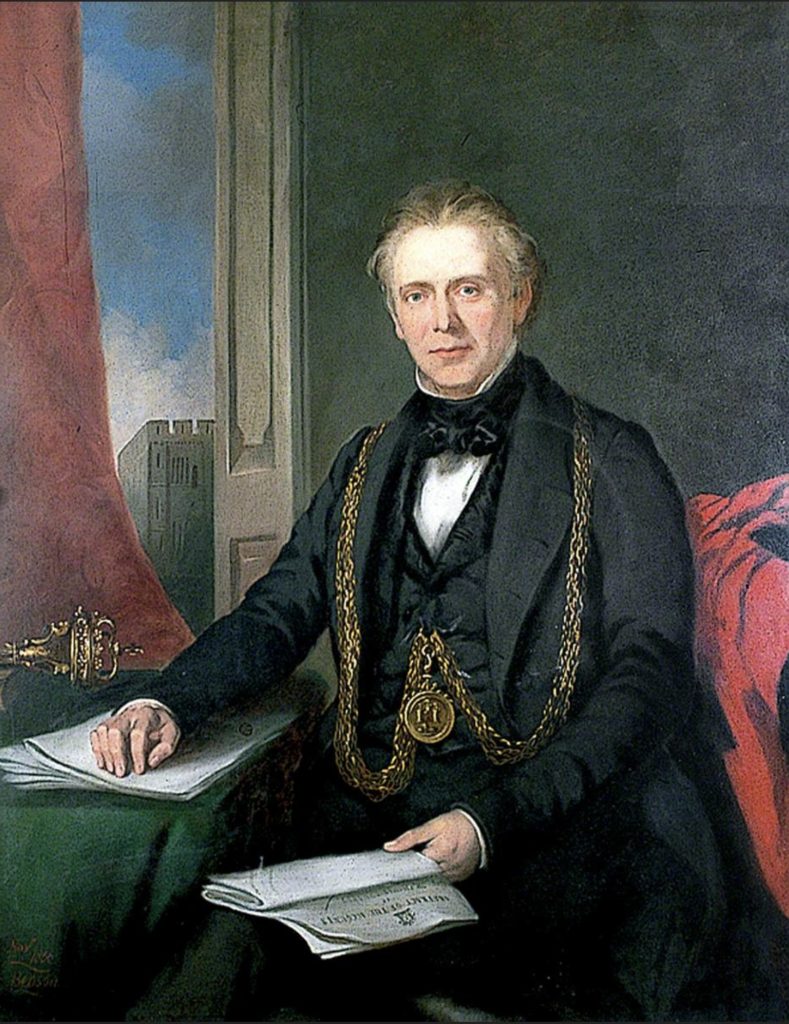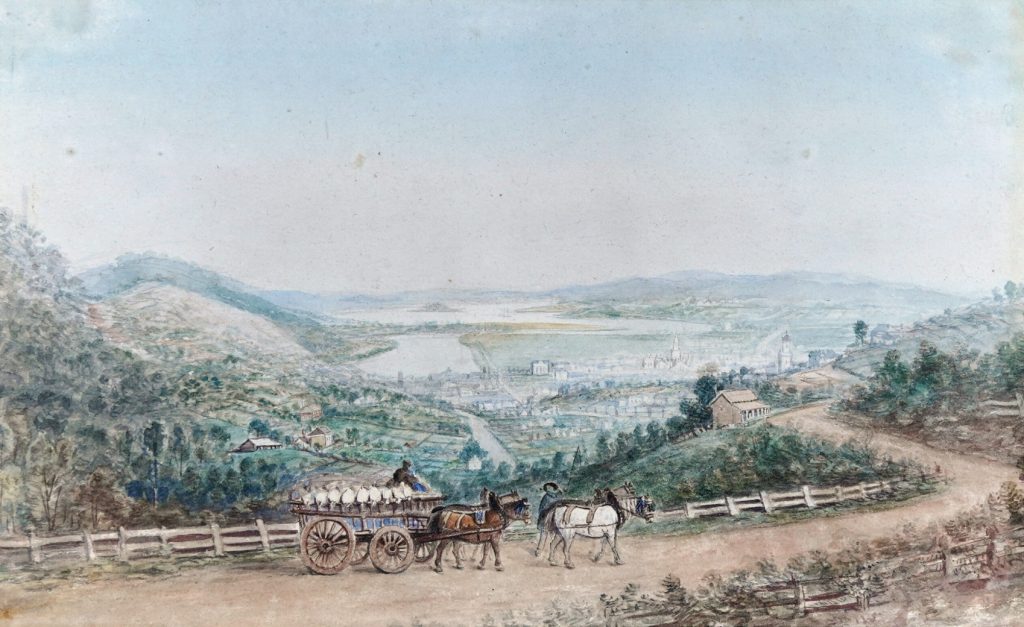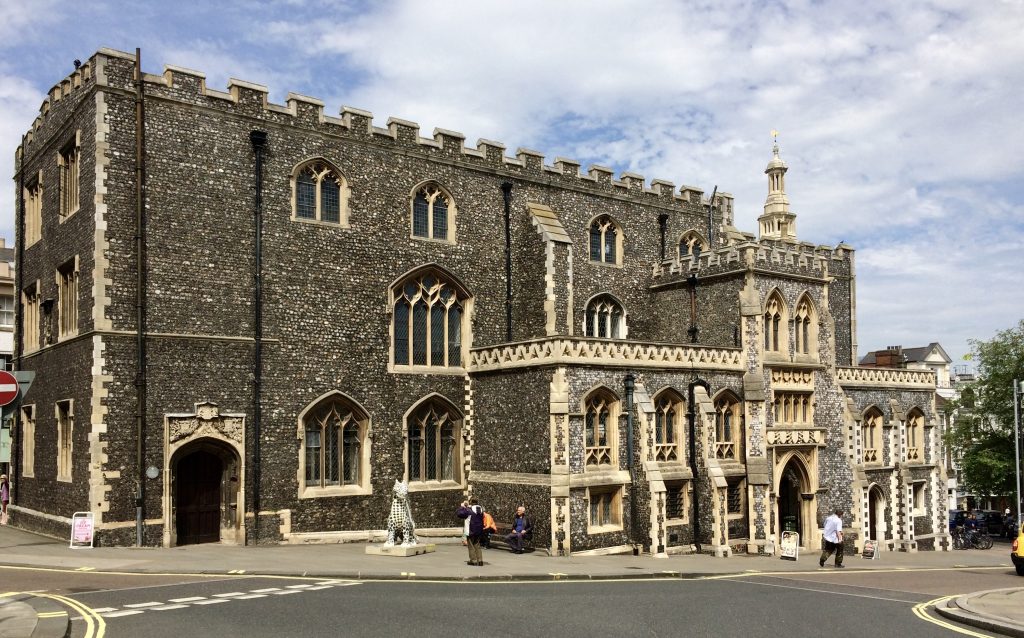John Dover, 1804 – 1865
John Dover was by his own admission a ‘noisy fellow’ who managed to annoy a lot of important people. But the Norwich Chartist leader paid the price with allies and enemies alike after stepping over the line once too often.
By the summer of 1840, a Norwich silk weaver and beerhouse keeper by the name of John Dover had turned himself into something of a hero among the city’s Chartists, and a public nuisance in the eyes of its political establishment.
Dover had not been among the men who had launched Chartism in the city in 1838; its principal figures were already known in Norwich working-class radical circles for their leadership of a weavers’ strike against wage reductions that summer, and they smoothly made the transition to the newly established Norwich Radical Association (Northern Star, 6 October 1838, p3). But as the early hopes of Chartism gave way to anger and the realisation that the Charter would not be conceded without a fight, new names were already coming to the fore.
John Dover had been born in Norwich and baptised in the parish church of St Paul on 5 February 1804. He married Martha Briant or Bryant at Thorpe St Andrews on 5 April 1824, and together they had two sons and a daughter.
Dover had been involved in political and trades union matters for some time before he became the mouthpiece of the local Chartist movement, possibly on behalf of the Whig faction which dominated municipal affairs. As early as 1833, as a freeman of the city, he was caught up in elections for the common council (Norfolk Chronicle, 30 March 1833). But with the arrival of Chartism, he found a new cause.
John Dover the Chartist
In August 1839, amid rumours of armed risings in the wake of Parliament’s rejection of the first Chartist petition, John Dover, ‘the keeper of a beer shop in St Paul’s, long known in this place, as amongst the foremost in radical excitements’, was arrested for having asked a smith to manufacture a consignment of pikes. Declining legal representation, Dover was openly contemptuous of the evidence against him, and of the justices – and perhaps surprisingly, he escaped with little more than a warning about his behaviour (NC, 17 August 1839).

John Dover had arrived as the unruly voice of Norwich Chartism, and in early 1840, he was despatched by the Norwich Chartists to see the Whig mayor, John Marshall, in an attempt to get permission to use the medieval St Andrew’s Hall for a Chartist meeting. Although the hall had been a regular venue for political and other meetings for centuries, the mayor turned him down.
So when shortly afterwards the mayor called a public meeting at the Guildhall to draw up an address congratulating the Queen and Prince Albert on surviving a recent assassination attempt, Dover was ready and waiting. As soon as the address was moved, he was on his feet. ‘No one is more ready to congratulate our sovereign than I am at her escape from the assassin’s ball, but we ought to mention at the same time to Her Majesty the distress that pervades all classes of the people,’ he began, to an uproar of hisses and ‘much confusion’ (NS, 27 June, 1840, p1).
When the mayor refused to take his amendment, Dover instead moved an addendum calling on the Queen to dismiss her advisers and pardon those convicted of political offences, including the Newport Chartist leaders Frost, Williams and Jones. Once again there was ‘immense confusion’ in the hall and amid ‘cheers and hooting’ the mayor refused the proposal. And so it went on:
Mr DOVER: I am sorry, Mr Mayor, that you should put yourself in such a passion. (Laughter and noise.) If you listened to me I should endeavour to prove that a great deal of discontent—
The MAYOR: I will not put such an amendment.
Mr DOVER: If you object to put my amendment then I shall propose a direct negative to the Address. (Loud cheers from a large body of Chartists.)
The MAYOR: That you can do if you choose.
Mr DOVER: I say the best means of protevction to the throne and the welfare of the people is for her Majesty to dismiss – (renewed uproar) – to have nothing to do with either Whigs or Tories, and (Increased noise and confusion).
Desperate to restore order, the Mayor now called for a show of hands and declared the original resolution carried. But Dover was having none of it and insisted on seeing a show of the votes against – with some two-thirds of those present now raising their hands. Attempts at further resolutions in support of Prince Albert and the Duchess of Kent (the Queen’s mother) were ridiculed, Dover declaring that the people could hardly be expected to congratulate the Prince when he was receiving £30,000 a year while they were starving, or the Duchess when the Poor Laws threatened to rip children from their mothers’ arms.
With the meeting descending into chaos, the mayor declared all three loyal resolutions carried and swiftly left the hall. In his absence, the Chartists gave ‘three cheers for Feargus O’Connor, three cheers for the Welsh patriots, three cheers for Mr Dover, and three groans for the hypocritical Whigs’.
This was evidently a tactic that worked well for Dover and the Chartists. So when the high sheriff of Norfolk convened a meeting at St Andrew’s Hall to form a local branch of the society ‘for the suppression of the slave trade and the civilization of Africa’, some 60 or 70 Chartists turned up to mingle with the local elite (English Chronicle, 21 November 1840).
Once again there was uproar as the Bishop of Norwich proposed the first resolution, and Dover sought to amend it. ‘The High Sheriff enquired whether the claimant to be heard was either a freeholder or inhabitant of the County of Norfolk.’ But he was not to be put off that easily: ‘Mister Dover, who was attired in a fustian jacket replied, that he was a freeholder of the county, and a freeman of the city of Norwich.’
Addressing the meeting ‘in a strong provincial tone’, Dover declared that no one there was more opposed to slavery, but that there was ‘a misunderstanding on behalf of the gentlemen’ as to the extent to which slavery existed. Accusing the Bishop of gross hypocrisy, he argued that the working men of England were denied full remuneration for their work, and that ‘a man who does not receive a fair equivalent for his labour is a slave to all intents and purposes’.
Dover succeeded in speaking at length, but there was renewed turmoil when despite a close vote the high sheriff declared the vote carried. Joseph John Gurney, a younger son of the Norwich banking family and local Whig notable, was reduced to appealing to Dover for quiet on the part of the Chartists so that he could speak – to which Dover replied that his friends were not slaves and he was in no position to gag them. ‘How is it that you have become so unpopular here in Norwich as to be obliged to appeal to me, a weaver, to get you a hearing?’ he asked.
In what was now becoming a regular feature of such gatherings, the high sheriff eventually gave up, declared all the resolutions carried, and ‘the meeting separated in the greatest uproar and confusion’.
News of the Norwich Chartists’ intervention spread rapidly. Kidderminster’s Chartists burst into applause when they were read a newspaper account of it, while those in Birmingham, Salford, Chesterfield, South Lancashire and elsewhere voted to congratulate Dover and his supporters on their ‘honest, noble and patriotic conduct’ in exposing the ‘dignities and respectables of Norwich’ (NS, 28 November and 5 December 1840).
Dover was by now getting into his political stride. His next political intervention was at a vestry meeting in the parish of St Paul, where he prevented an attempt by the churchwarden to levy a church rate by moving an amendment to adjourn the meeting for twelve months. Told that his amendment had been rejected, he successfully demanded a poll of the parish as a delaying measure (NC, 6 March, 1841).
There was additional recognition for Dover’s efforts that spring when he was elected as Norwich’s delegate to the ‘petition convention’ called by the National Charter Association in London to present the petition on behalf of the Chartist prisoners.
John Dover’s downfall
But when Dover inserted himself into the 1841 general election campaign, his political luck ran out. In line with their usual practice of carving up the city’s two parliamentary seats between them the Tories had nominated the Marquis of Douro (eldest son of the Duke of Wellington), and the Whigs Benjamin Smith; they hoped for un uncontested election
But on election day, Dover nominated William Eagle, a Suffolk barrister, to contest Norwich on behalf of the Chartist cause. Despite efforts to shut him up, Dover talked at length about the record of both the Whigs and Tories, advocated each of the six points of the Charter, and claimed that but for the property qualification ‘I could find you operatives that would make good Members of Parliament’. John Whiting, a Chartist ally, seconded the nomination.
After a show of hands, the sheriff declared Douro and Smith elected. Dover contested this and ‘stamping on the table’ demanded a poll (NC and NS, both 3 July 1842). Told that this would cost each candidate £200, Dover attempted to put forward sureties for the amount, but these were rejected. To the evident consternation of other Chartists present at the count, who seem to have had little trust in their leader, Dover and Whiting withdrew to a side room at the Guildhall with the city treasurer. When the Chartists, ‘maddened with rage’ burst the lock, it was to discover that their leaders had withdrawn Eagle’s nomination in return for a payment of £50.
On his way out of the building, Dover was physically attacked ‘by his incensed friends’ and forced to run back to the Guildhall for protection. Throughout the day, large groups of men kept watch on the building, waiting for him to emerge, but by evening they were losing patience and began to throw bricks and other objects, smashing the windows. Police attempted to break up the crowd, but were beaten back, until eventually the mayor called in a detachment of dragoon guards and read the Riot Act.
Dover escaped unnoticed in the aftermath, but a Chartist meeting the following evening heard that he had been seen at the King’s Head in St George’s Colegate, where he had been living with the landlady, Charlotte Humphrey, since leaving his wife. A huge mob set off, laying siege to the building before breaking in and discovering Dover, who drew a sword and attempted to defend himself. Though several of his assailants were injured, they succeeded in taking the sword from him and dragging him out into the street where he was beaten, kicked and stripped of his shirt. Amid cries of ‘throw him over the bridge’, Dover was dragged to the river, with some suggesting that he should be taken instead to the market place ‘to make a public example of him’. Luckily, his eldest son managed to prevent a likely lynching by clinging to his father until the police arrived.
Dover was taken off to safety, but rioting continued in Elm Hill that night, and once again the dragoons were sent in to restore order. More than twenty of those arrested in the disturbances of the two nights were brought up in court the following day; most were intimidated with the threat of transportation before being discharged with cautions.
John Dover’s legal difficulties
Dover was never again associated with Chartism. But tempers evidently cooled and he seems to have gone on with his life in Norwich without further difficulties. With hindsight, Dover may well have been set up for the fall by his political opponents: though foolish in the extreme to have accepted it, he certainly was not the source of the very specific claim that he had taken a £50 bribe and the beneficiaries of his downfall are not hard to identify. In the cold light of day this may also have occurred to those who had tried to lynch him
But these were not the end of his troubles. Dover had never been good with money. In 1838, describing himself as a milk-seller, weaver, bombazine manufacturer and beer-house keeper, he had been brought up before the magistrates over an unpaid bills of £116 (NC, 30 June 1838). He was in court again in 1839. Accused in cross-examination of being a ‘noisy fellow’, he replied with typical bravado and an obvious reference to his pre-Chartist political activism: ‘‘I know I am a noisy fellow. I have been noisy for the Whigs, and you Mr Marshall have paid me for making a noise for them’ (NC, 1 March 1839).
Two years later Dover’s house was searched and he was convicted of having stolen worsted and silk in his possession (NC, 25 January 1840). He escaped punishment on a technicality when it proved impossible to identify the real owners. And despite the widespread belief that he had done well out of his political double-dealing, in 1842 he was back in front of the court for debt once more. In his defence he said that he himself was owed small sums by 23 named people, mostly for beer. He was discharged after claiming that he had no furniture other than a loom and that he paid Mrs Humphrey 9s a week for lodging with her. It was quite a come-down.
Towards the end of 1844, things went from bad to disastrous for Dover when search warrants were issued naming him and Humphrey among a list of eleven suspects thought to be in possession of yarn and silk stolen from the city’s factories (Norwich Mercury, 23 November 1844). Brought up before the magistrates on 31 December, Dover was said to have been found with thirty ‘cotton cops’ stolen from the workhouse factory two months earlier, and despite his denials was committed for trial (NC, 30 November 1844). In court, Dover could only say that he would have had no way of knowing if any of the cops were stolen, but denied having any criminal involvement, and he called Charlotte Humphrey as a witness to swear that she had seen these or similar cops in Dover’s possession months before the theft was said to have taken place.
The jury convicted Dover and a co-defendant. But there was a nasty sting in the tail. They had been tried twice on consecutive days for linked offences relating to the same stolen goods. And as the recorder told them: ‘It was usual, in all cases that came into that Court, that when parties were convicted of a second offence they should be transported; and he did not see why he should depart from that rule in the present instance’ (NC, 11 January 1845). Dover was to be transported for fourteen years – in effect, a life sentence.
John Dover in Van Diemen’s Land
Dover spent some weeks in prison at Norwich before being sent by coach to London, where he was at first held in the Millbank Penitentiary. From here he was put on board the convict ship Theresa, sailing on 1 April and arriving at Hobart Town in Van Diemen’s Land (later Tasmania) on 3 July 1845. He was one of 220 male convicts on board.
John Dover’s convict record, created when he arrived in Hobart, includes a detailed physical description of the then 41-year-old former Chartist: 5’8” tall, with blue eyes, brown hair and red whiskers, he had a ruddy complexion, and an oval face with large nose and chin. The surgeon’s report describes him as in good health. It also notes that he could read and write, and was a Protestant.
Dover was made to work at a number of locations in Tasmania and appears to have had neither the time nor the inclination for politics, but on 11 October 1853 he was given a conditional pardon that effectively set him free. He would never return to England, and nor would he see either Martha or Charlotte again. But in a pragmatic if strictly illegal move as Martha was still alive back in England, on 25 October 1863, at the Baptist chapel in York Street, Launceston, 58-year-old Dover married 21-year-old Mary Ann Sherman.
Dover died, of consumption according to the official record, at Launceston on 12 September 1865.
Notes and sources
All newspaper reports are taken from the British Newspaper Archive online. After the first mention, reports from the Northern Star appear as NS, and those from the Norfolk Chronicle as NC.
Drink in Victorian Norwich, by Rob Donovan is an excellent account of the part played by alcohol in the city’s working-class communities in the 19th century.


